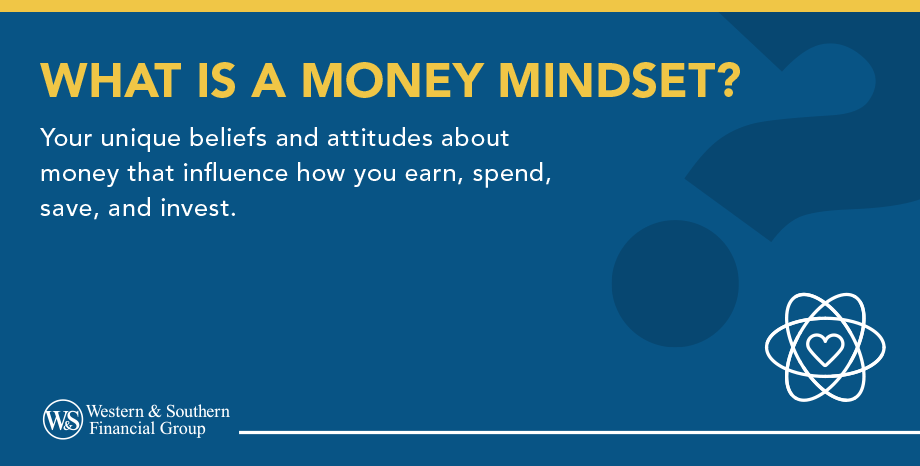

Key Takeaways
- A money mindset refers to your beliefs and attitudes about money, shaping your financial behavior.
- Replacing limiting beliefs with empowering ones is crucial for financial success.
- Setting clear financial goals is key to developing a positive money mindset.
- Practicing gratitude can help shift from scarcity to abundance thinking.
- A positive money mindset helps reduce financial anxiety and enables informed decision-making.
What Is a Money Mindset?
A money mindset is your unique set of beliefs and attitudes about money. It drives your financial behaviors, how you save or spend, and how you perceive wealth.
How you think about money could hold you back or propel you forward. A positive money mindset allows you to create a healthy relationship with your finances, opening the door to smarter decision-making, healthy money habits, and financial wellness.
For example, if you see money as a finite resource that is hard to earn and quick to lose, you might approach financial opportunities with fear and hesitation. On the other hand, viewing money as a tool for growth can lead to bold investments, smarter risk-taking, and a willingness to plan long-term.
The Importance of a Healthy Money Mindset
Your mindset surrounding money impacts every aspect of your financial stages in life, from how much you earn to how you manage what you have. A positive money mindset can:
- Improve Spending Habits: Instead of falling victim to emotional purchases, a healthier perspective on money can lead to more intentional spending.
- Encourage Savings: When you value financial security, saving becomes a habit rather than a chore.
- Empower Goal Setting: With a positive outlook, setting financial goals like buying a home, retiring comfortably, or traveling becomes achievable rather than daunting.
- Combat Financial Anxiety: A positive money mindset can reduce stress and anxiety around finances, empowering you to feel in control of your money instead of feeling at its mercy.
Signs You Have a Negative Money Mindset
Before you can improve your money mindset, it’s important to identify any harmful beliefs that might be holding you back. Here are some signs that your current money mindset may be more negative than positive:
- Constant Fear of Running Out: You frequently worry about not having enough money, even if your income covers your needs.
- Belief That Wealth Is “Not for You”: You think being wealthy is something other people can achieve, but not you.
- Blame and Resentment: You blame external factors - like the economy, your upbringing, or even wealthy people - for your current financial situation.
- Avoidance: You avoid looking at your bank statements, ignore budgeting, or try not to think about money because it’s overwhelming.
These thoughts and behaviors create a vicious cycle, limiting your ability to change your financial situation and grow wealth.
How to Cultivate a Positive Money Mindset
The good news is that anyone can change their mindset about money with conscious effort and practice. Here are some practical steps to develop a positive relationship with money:
1. Identify and Challenge Limiting Beliefs
The first step towards changing your money mindset is recognizing the limiting, deep-rooted beliefs holding you back. Do you believe you’ll never earn enough because of your current job? Or do you think saving is impossible, given your expenses?
Challenge these personal beliefs by reframing them. Instead of thinking, “I’ll never be able to save because my expenses are too high,” try thinking, “How can I adjust my spending to save more?”
Identifying negative beliefs and replacing them with more empowering ones can slowly transform your relationship with money.
2. Set Clear Financial Goals
Goal-setting gives purpose to your money. Set clear, achievable financial goals for both the short term and long term. Whether paying off credit card bills, saving for a vacation, or investing for retirement, having goals can help motivate you to make smarter financial decisions.
Break your goals down into smaller, actionable steps so they feel attainable and manageable.
3. Educate Yourself About Money
Knowledge is power. One of the best ways to improve your money mindset is to educate yourself about personal finance. The more you understand about money, the less intimidating it becomes. Read books, listen to financial podcasts, or follow reputable personal finance blogs to expand your knowledge.
Financial education can give you the confidence to take control of your finances and see money as an opportunity rather than a burden.
4. Develop Healthy Financial Habits
Changing your mindset requires changing your money habits. Start small:
- Track Your Spending: Use a money-tracking app or simply write down your daily expenses. This will help you stay mindful of where your money is going.
- Create a Budget: Budgeting isn’t about restricting yourself; it’s about creating a plan for your money that aligns with your goals.
- Automate Your Savings: Automate savings or investment account transfers for effortless and consistent savings.
5. Practice Gratitude
A powerful way to improve your relationship with money is to practice gratitude. Focus on what you have rather than what you lack. Take time each day to appreciate what your current financial situation allows, whether putting food on the table, having a roof over your head, or enjoying a night out with friends.
Shifting your mindset from scarcity to abundance can help you see money more positively.
6. Surround Yourself with Positive Influences
The people around us have a significant impact on our mindset. Surround yourself with people who have a positive approach to money. Join groups or forums that focus on financial growth.
Engaging in conversations with people who value budgeting, investing, and financial planning can inspire you and help reinforce your own positive beliefs around money.
Understanding the Difference Between Scarcity and Abundance Mindset
One key aspect of developing a positive money mindset is understanding the difference between a scarcity mindset and an abundance mindset.
- Scarcity Mindset: This mindset believes there is never enough. People with a scarcity mindset focus on limitations and tend to fear financial loss, which can lead to hoarding or overly cautious behavior.
- Abundance Mindset: In contrast, an abundance mindset focuses on the idea that there is enough for everyone. It allows for generosity, calculated risk-taking, and seeing opportunities instead of obstacles.
An abundance mindset doesn’t mean being careless with money or pretending problems don’t exist. Instead, it’s about believing in the possibility of growth and recognizing the potential for opportunities, even in difficult times.
Shifting from a Scarcity to an Abundance Mindset
To shift from a scarcity mindset to an abundance mindset, start by looking for opportunities, even in small ways. For instance:
- Instead of thinking, “I can’t afford that,” ask, “How could I afford that?” This simple shift encourages creative problem-solving.
- Focus on growth by investing in skills that can help you increase your earning potential.
- Celebrate the financial success of others rather than feeling envious or resentful. Believing that wealth is available to everyone helps eliminate feelings of competition or inadequacy.
Mindset Exercises for Improving Your Relationship with Money
Here are a few practical exercises you can use to improve your experiences with money:
1. Money Journaling
Start a money journal where you record your thoughts about money. Write down your core beliefs, fears, successes, and challenges. This exercise will help you identify patterns in your thinking and behaviors, allowing you to make conscious changes to your relationship with money.
2. Visualization
Spend a few minutes each day visualizing your financial goals. Picture yourself living debt-free, taking that dream vacation, or retiring comfortably. Visualization can help reinforce positive feelings towards money and motivate you to take the necessary steps to achieve your goals.
3. Budgeting as a Form of Empowerment
Budgeting should be approached as a form of empowerment rather than a restriction. By creating a monthly budget, you’re giving yourself the power to decide where your money goes. This is an active form of controlling your financial future rather than letting circumstances dictate your path.
Conclusion: Transform Your Money Mindset Today
Developing a positive money mindset is a critical step toward achieving financial freedom. By replacing limiting beliefs about money with empowering ones, setting clear financial goals, and practicing gratitude, you can transform how you manage and view your finances.
Shift your money mindset to reduce stress and grow your wealth. Get My Free Financial Review
Frequently Asked Questions
What is money dysmorphia?
Money dysmorphia is a term used to describe a distorted view of one's financial life, similar to how body dysmorphia affects one's perception of their physical appearance. People experiencing money dysmorphia may feel intense anxiety and insecurity about their finances, even if they are objectively doing well.
This can lead to unhealthy behaviors like overspending, compulsive saving, or constant comparison to others, hindering their ability to enjoy their money and achieve financial stability.





















